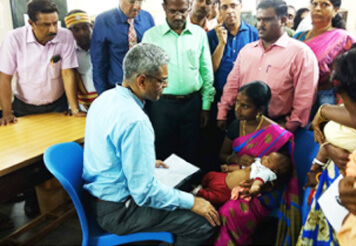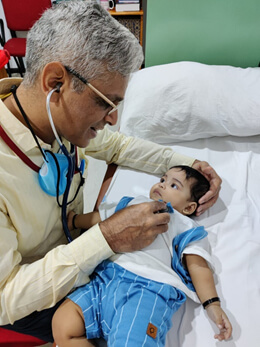The Healer’s Journal: The vision to make congenital heart defect treatment in India affordable and accessible
August 8, 2022 | Contributed by Dr. Krishna Kumar
I have always wanted to be a doctor for as long as I can remember. I did my MBBS in Maulana Azad Medical College, Delhi (1979-84) and wanted to be a surgeon. I qualified for the postgraduate entrance in AIIMS, New Delhi but qualified for my second choice, Internal Medicine. I thought I would give this a try for 6 months but chose to stay on as I liked it. Upon finishing my PG (1988), I decided to pursue cardiology and qualified for the intensely competitive DM program at AIIMS (1989- 90). This was essentially an adult cardiology program with a 2-month rotation in pediatric cardiology.
During my training years, I was exceptionally fortunate to be mentored by Prof. Raj Tandon. Dr.Tandon had a profound influence on his students. He was a role model for many generations with legendary clinical skills, remarkable humility and set the highest standards of academic and professional integrity. He took a deep and genuine interest in the careers of his students. I decided to follow in his footsteps and by the time I qualified, I had made up my mind to devote my career exclusively to pediatric cardiology and Congenital Heart Defect Treatment.

At that time there were no training opportunities in pediatric cardiology in India and only a few institutions overseas offered a structured training in child heart treatment. I was also somewhat handicapped by the fact that I did not have basic pediatric training. Dr.Tandon insisted that I should do the fellowship in pediatric cardiology at the Boston Children’s Hospital which was the leading program for pediatric cardiology in the world. It was an intensely competitive program and I came to know after I joined that they made several exceptions when they offered me a position there for the 1994 program. I was told that the strongest reason for selecting me was the recommendation letter from Prof. Tandon.
The fellowship training program at Boston opened my eyes. I saw exceptional child heart treatment outcomes being delivered through a highly coordinated teamwork involving a number of care providers belonging to a variety of complementary specialties. I immediately recognized that this was the single most important missing ingredient in Indian programs back then. While it is true that we lacked human and material resources, I realized that the limitation could be substantially overcome if we built a cohesive team. The second very important lesson I learnt in Boston was the importance of empowered nursing.
I returned to India in 1996 determined to reproduce the results that I saw at Boston. As expected, there were numerous challenges. My first few years were frustrating because I could only find a job in a corporate, for profit, hospital. We were turning away children who needed congenital heart care treatment but could not afford the same.

Perhaps my greatest stroke of good fortune was when I was invited to consider starting pediatric cardiology services at the Amrita Institute of Medical Sciences (AIMS) in 1997. The hospital was being built then but there was clearly spelt out commitment to serve everyone irrespective of their economic condition. The founder, Mata Amritanandamayi, spelt out the simple, yet profoundly impactful mandate- ‘The best quality of care should be made available to the poorest person”. This instantly appealed to me, and I joined the hospital from its inception in June 1998.
Since then, it has been an exhilarating journey. I could help develop a program on the lines of my vision of developing a highly cohesive team constituted by pediatric cardiologists, pediatric heart surgeons and anaesthesiologists, specially trained nurses, social workers, perfusion technologists and respiratory therapists. The program has grown considerably over the years and has acquired global reputation in quality of clinical services, research, and training. The pediatric cardiac program at AIMS, Kochi was awarded the BMJ award for quality improvement (2014) for delivering outstanding clinical outcomes. We developed dedicated training programs and trained a substantial proportion of the national work force in pediatric cardiology and other specialties related to child heart treatment. We also networked with a number of philanthropic organizations that have enabled us to offer care to almost all children needing congenital heart care treatment who come to our institution irrespective of their economic condition. A prominent partner in this journey has been the Genesis Foundation.

The program and the hospital gave me a perfect academic environment to pursue contextually relevant research interests. We have published extensively on epidemiology of pediatric heart disease, finding solutions to unique challenges in congenital heart care treatment in low resource environments. We have been able to develop cost effective solutions that has enable affordable child heart treatment. Over the last 20 years we have been able to publish over 200 papers and edit 4 major textbooks.
After 24 years at AIMS, I can say that I have to a large extent fulfilled my dream of contributing to a system that seeks to deliver equitable pediatric cardiac care. This essentially requires us to deliver accessible, affordable care that is of the highest possible quality for the resources we possess. We have also been able to educate numerous pediatricians in the region who are looking to help provide care for children with heart disease at various stages in the disease continuum.
There are important challenges that lie ahead in the coming years. We have to be mindful of the serious threats to sustainability of congenital heart care treatment that are now universal. These threats include, availability of nurses and other professionals, emergence of antibiotic resistance, burnout among health care professionals and economic viability of pediatric heart programs. We need to continue to develop systems to enable responsible use of resources while maintaining an unfailing commitment to quality. We must explore ways to generate more resources for our patients through philanthropic organizations such as the Genesis Foundation.

